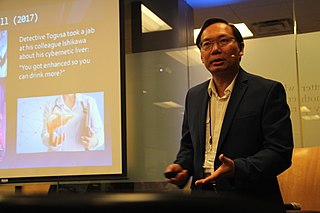A Quote by Tad Williams
Every major technological step forward has profoundly changed human society - that's how we know they're major, even if we don't always realise it at the time. Farming created cities. Writing, followed eventually by printing, vastly increased the preservation and transmission of cultural information across time and space.
Related Quotes
I'm even stunned at some of the majors you can get in college these days. Like you can major in the mating habits of the Australian rabbit bat, major in leisure studies... Okay, get a journalism major. Okay, education major, journalism major. Right. Philosophy major, right. Archeology major. I don't know, whatever it is. Major in ballroom dance, of course. It doesn't replace work. How about a major in film studies? How about a major in black studies? How about a major in women studies? How about a major in home ec? Oops, sorry! No such thing.
One of the messages I presented to the coal industry was, "If you want to have major transmission built, start encouraging wind development." That's because the cultural value and acceptance of wind energy provides an opportunity to build transmission lines that are not as desirable with traditional forms of generation.
We live in a cluttered culture, a culture of information in which even our computers can't tell us what's worth knowing and what is merely cultural scrap. In such a society, we don't have the experience of contemplative space, of the time or mood to engage a book of poetry or even read a novel. Who can achieve the unconscious-conscious state of the reader when everything is stimulation, everything is movement and information?
We might expect intelligent life and technological communities to have emerged in the universe billions of years ago. Given that human society is only a few thousand years old, and that human technological society is mere centuries old, the nature of a community with millions or even billions of years of technological and social progress cannot even be imagined. ... What would we make of a billion-year-old technological community?
Writing comes into being to retain information across time and across space. Before writing, communication is evanescent and local; sounds carry a few yards and fade to oblivion. The evanescence of the spoken word went without saying. So fleeting was speech that the rare phenomenon of the echo, a sound heard once and then again, seemed a sort of magic.
The first step to the knowledge of the wonder and mystery of life is the recognition of the monstrous nature of the earthly human realm as well as its glory, the realization that this is just how it is and that it cannot and will not be changed. Those who think they know how the universe could have been had they created it, without pain, without sorrow, without time, without death, are unfit for illumination.
If the Universe came to an end every time there was some uncertainty about what had happened in it, it would never have got beyond the first picosecond. And many of course don't. It's like a human body, you see. A few cuts and bruises here and there don't hurt it. Not even major surgery if it's done properly. Paradoxes are just the scar tissue. Time and space heal themselves up around them and people simply remember a version of events which makes as much sense as they require it to make.





































